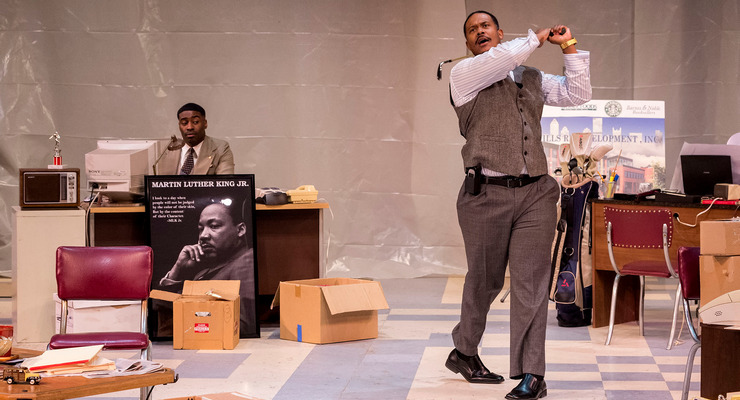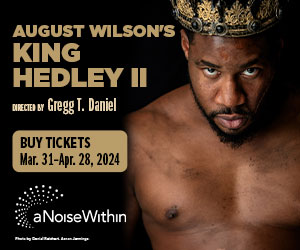
Christian Telesmar and DeJuan Christopher
Photo by Craig Schwartz
Pittsburgh developer Harmond Wilks (Christian Telesmar) is a big man with a big problem. As his campaign for mayor begins to kick into high gear, he is also looking forward to a new development in his hometown, one that will put him on the map, politically and literally.
His problem, however, is that there is a home on the property that he and his partner would like to develop, and of course, the owner of that home is in no mood to sell anything, let alone to a developer he doesn’t know or trust.
This tale, set in 1997, could easily be set in last week, or next.
As the final play in August Wilson’s American Century cycle, “Radio Golf” is a powerful story of a man caught in a moral dilemma – a very common tale actually, but it’s those stories that tell the measure of a man.
The presentation is even more powerful with the presence of Telesmar, who is convincing and persuasive as the troubled upwardly mobile real estate developer turned politician. In so many dramas and films, what we are seeing is actors clearly playing characters. In this production from A Noise Within Theater, we are seeing the people of Pittsburgh simply telling their story.
Director Gregg T. Daniel, has infused the cast with equal measure of drama and reality. The play takes place entirely within Wilks’s office, but we feel the neighborhood and the presence of history in Daniel’s presentation of Wilson’s story.
In the midst of opening his new real estate office, Wilks discovers his dilemma. Meanwhile, his erstwhile partner Roosevelt Hicks, played by DeJuan Christopher, is already counting the money from their new project.
A mover and shaker of his own, he’s also been offered a partnership in a powerful radio station, by a local White entrepreneur, hoping to secure Federal funding. He can see his empire beginning to take shape. He pictures golf courses and radio stations as far as his eyes can see. Christopher is broad and bold in his portrayal of the ambitious hicks.
Meanwhile, Elder Joe Barlow, played by Alex Morris, pays a surprise visit to the office “looking for a lawyer.” Barlow owns the home — 1839 Wiley—which is blocking the development of the project.
Wilks quickly learns that Barlow is supposedly the owner of the property, but he feels confident in the fact that he himself purchased the home years earlier.
The success of the project depends on acquiring the house.
Cue the moral dilemma, and throw in Sterling Johnson, (Matt Orduña), coincidently, Wilks’ childhood friend.
Johnson is essentially the voice of the neighborhood and acts as an erstwhile Greek chorus to the play’s progression.
Orduña plays the role with the seething resentment of what he sees as both the abandonment and blind development of the neighborhood where he grew up. Growing up entirely differently from Wilkes on the same streets, he is the blue-collar version of Wilks’ ambitions.
Although the production is mostly dialogue (there’s very little music, if at all) the production is fast-paced and intriguing though we can see what lies ahead pretty clearly.
Morris, whose voice and delivery at times is hard to understand (actors spend a few too many moments talking with their backs to the audience), is as convincing and as proud as any of the others.
Like Johnson, these are the streets Barlow grew up on. He knows where the bodies are buried, literally.
Once it is revealed that he has the upper hand in his negotiations, for various reasons, he turns down an offer by Wilks on the property, and as the offer is turned down, the deal begins to turn sour.
With the strong actors’ performances, the anger is sometimes visceral, as is the frustration that all are feeling throughout the story. The actors are the story in this production and they tell their story very well.
Like so many of the Noise Within productions, the production design and lighting and wardrobe are first-rate.
Plays with as much weight as August Wilson’s could easily be mishandled in lesser hands. Director Daniel moves the story along quickly and knows when to let things boil over. Or simply simmer.
August Wilson’s Radio Golf, directed by Gregg T. Daniel, runs through November 13 at A Noise Within Theater. A Noise Within is at 3352 East Foothill Blvd. Pasadena CA. (626) 356-3100. www.anoisewithin.org.













